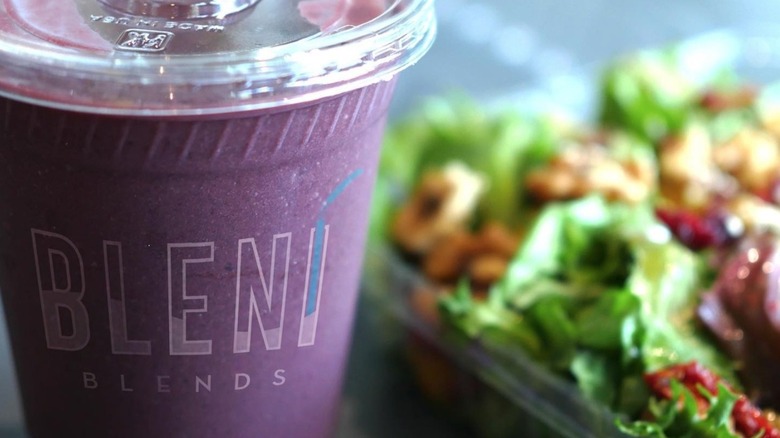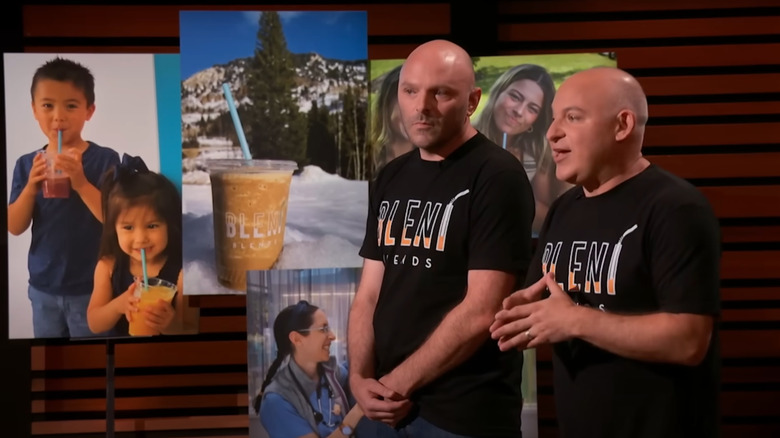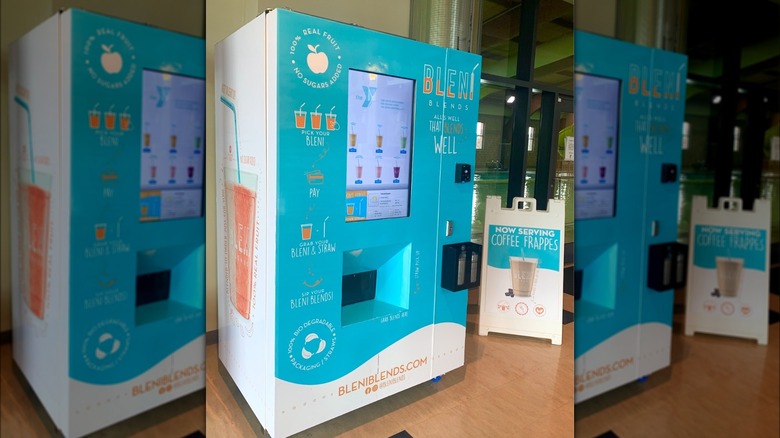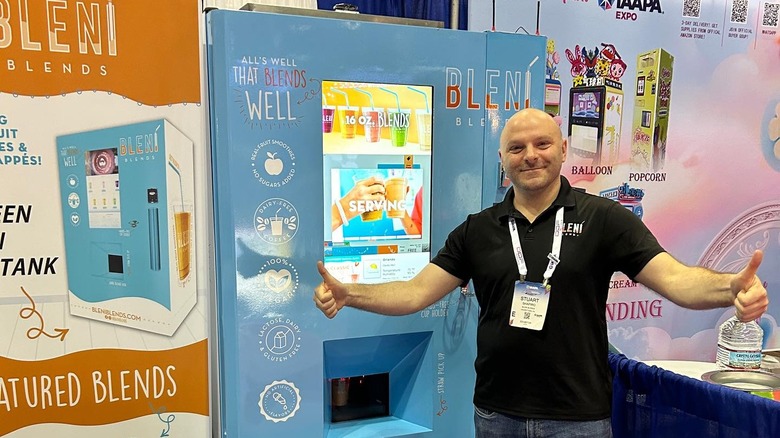Bleni Blends: Here's What Happened After Shark Tank
When you're taking a break between meetings or running late for school, a vending machine snack starts looking pretty tempting. The problem is that most of those options are not very nutritionally dense, and you'll probably feel hungry again in no time. Peter and Stuart Shapiro sought to solve that problem with Bleni Blends — an unattended retail solution (i.e. vending machine) that provides freshly-made smoothies at the touch of a button. The brothers had to convince Kevin O'Leary, Mark Cuban, Lori Greiner, Daymond John, or Daniel Lubetsky to take a gulp on Season 14, Episode 18 of "Shark Tank," which aired in March 2023.
The secret behind the delicious smoothies is the company's own proprietary, shelf-stable fruit blends. The kiosks use a touch screen, are cashless, require minimal maintenance, and put a smoothie in the hands of a customer in just one minute. While they didn't invent the machines, the Shapiro brothers were involved in fine-tuning the mechanics and created all the branding. They drew from their previous franchisee experiences in working with a frozen yogurt kiosk, and acquired exclusive rights to sell the smoothie machines in the U.S. for the remaining 15-year life of the patent.
The business model entails that Bleni Blends either makes money off of servicing machines they own, or selling the machines and then having clients repurchase the fruit blends from them. "We own the entire supply chain," explained Stuart Shapiro on "Shark Tank." But did this slightly unconventional model put the Sharks off?
What happened to Bleni Blends on Shark Tank?
Peter and Stuart Shapiro initially sought $250,000 for 6% equity in Bleni Blends. The two pitched their smoothie kiosk as a nutritious alternative to the usual suspects found in a standard vending machine. To get the Sharks on board with their vision, they passed out samples of flavors including coffee, tropical, green, and strawberry-banana, earning rave reviews from the panel.
At the time, Bleni Blends managed 41 vending machines, with the most popular location earning around $8,000 per month. The smoothies retailed for $5.25 and cost $1.40 to make. The machines themselves cost $19,500 and could be resold for $30,000. After a slow start in 2020, revenues rose dramatically from $275,000 in 2021 to $465,000 at the time of filming in 2022.
Despite promising growth, Kevin O'Leary had a problem with the capital expenditures for the machines, and the minimum purchases Bleni Blends was required to make from their supplier. Daymond John found the licensing situation too risky. The fear of "something better" coming along in such a competitive market drove Mark Cuban away. Daniel Lubetsky and Lori Greiner came together for the only offer, with a 35% equity stake for $250,000. The brothers were quite iffy, proposing a few counteroffers with significantly low equity, which Lubetsky and Greiner rejected with a few laughs. After more discussion, the Shapiros countered by adding a $500,000 line of credit to Greiner and Lubetsky's offer, and with that, they were able to strike a deal.
What happened to Bleni Blends after Shark Tank?
Unlike similar "Shark Tank" products like Genius Juice and The Good Promise, Bleni Blends didn't experience the same benefits as consumer-targeted goods, because its product was up for purchase from other companies, not everyday shoppers. However, Bleni Blends has found great value in advertising that it secured a deal on "Shark Tank." Despite yielding nearly six times more equity than they planned, Peter and Stuart Shapiro still feel that the deal was worth it because of the Sharks' expertise. Daniel Lubetzky spoke very highly of the entrepreneurs in a post on X, formerly known as Twitter, writing, "Peter and Stuart are the real deal. They're amazing people who are working incredibly hard and have a bright future ahead. I'm looking forward to helping them win."
Bleni Blends has since added plant-based protein boosts to its menu. At the time of writing, smoothie flavors include strawberry-banana, tropical, green, berry, dragon fruit, coffee, and mocha. Unlike frozen smoothie mixes that are loaded with deceptive fillers, the Bleni Blends fruit products have no added sweeteners, and the coffee drinks contain just plain sugar.
Hospitals continue to be an important market for Bleni Blends. The company remained open throughout Covid-19, and the Shapiros are proud that they were able to provide safe and convenient food at a time when it was difficult to come by. The kiosks can now be found in a variety of clinics, sports complexes, gyms, convention centers, universities, and offices.
What is next for Bleni Blends?
Though the Sharks expressed concern about Peter and Stuart Shapiro not owning the patents to the machine, the brothers say that this has actually saved them a huge amount of investment in research and development. However, if the financials make sense, they're open to buying the intellectual property rights once the patent expires.
Bleni Blends is also a part of an unattended retail pilot program in partnership with Walmart. The company's machines are being tried out in a sort of automated café at a Denver, Colorado location. It goes without saying that striking a bigger deal with Walmart would be a game changer for Bleni Blends.
Bleni Blends has received numerous inquiries about using the machine to create smoothies with adult additions like delta-9-tetrahydrocannabinol (THC), cannabidiol (CBD), or alcohol, but at least for now, that does not align with the image of the company that the Shapiros have created. However, the brothers are always keeping their eyes open for exciting new ways to use the innovative Bleni Blends machine and related technologies. They also see potential for other uses in the shelf-stable fruit blends that they created.
"If there [are] other things that come up, we want to take those chances and be on the cutting edge," Peter Shapiro explained in an interview with Joe Pardo. With the "Shark Tank" investment being so recent, it'll be exciting to see how Bleni Blends is able to leverage its support from Lori Greiner and Daniel Lubetsky.




